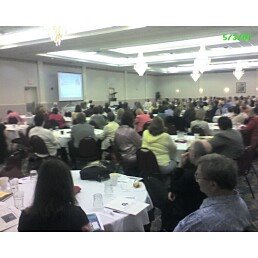Approaching my 59th birthday, I'm thinking more about how long I'll stay in this job (speculation on how eagerly my departure is anticipated by other staff is counterproductive). I'm aware that in the last forty-some years, our library has not had a director stay until age 65, and as I look around at my fellow boomer/administrators, I certainly see a lot of people retiring as soon as possible. Two director colleagues who have retired in the last year have both advised me that they're not a bit sorry and everyone should retire ASAP. Change can be good for the organization as well as for the director.
I've been working continuously full-time since 1975, here since 1978, and as Director since 1996. As a career winds down, there are challenges:
- Stay fresh
- Don't burn out
- Don't coast
From where I sit, the way to do this is not only in all the real excitement of Library 2.0 opportunities, which are surely a great way to stay fresh, but in some good old Management 1.0 virtues:
- Think long range
- Think big picture
- Stay positive
- Stay involved in local and professional community
- Focus on organizational goals
This means not to get seduced by opportunities to do something big or splashy before getting out the door, but to pay attention to the plans and think years ahead. The trick is to make plans for beyond the time I'll be here but accept that the next Director may toss them out and take a whole different tack. So it goes: since nothing's permanent, there's no point in getting hung up on what happens when I move on. In making plans, I need to listen to the customers and staff and try to make this the library they need it to be, not just the one I think it should be.
I'm eligible for Social Security in 1,105 days. But who's counting? I've got a lot to learn and a lot to do!
 CAP Services, at their annual award ceremony May 30, presented the Gaylord Nelson Anti-Poverty Award to the Project Promise collaboration. Michael Kenney, our library's Marketing & Development Coordinator, and Paula Morgen of the ThedaCare Community Health Action Team, received this plaque on behalf of all the agencies who worked together on the project.
CAP Services, at their annual award ceremony May 30, presented the Gaylord Nelson Anti-Poverty Award to the Project Promise collaboration. Michael Kenney, our library's Marketing & Development Coordinator, and Paula Morgen of the ThedaCare Community Health Action Team, received this plaque on behalf of all the agencies who worked together on the project.


